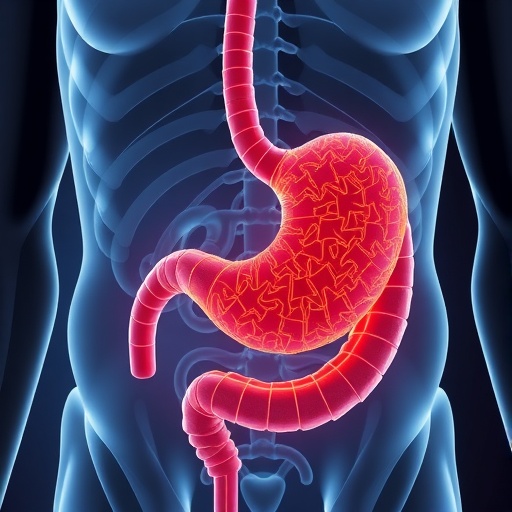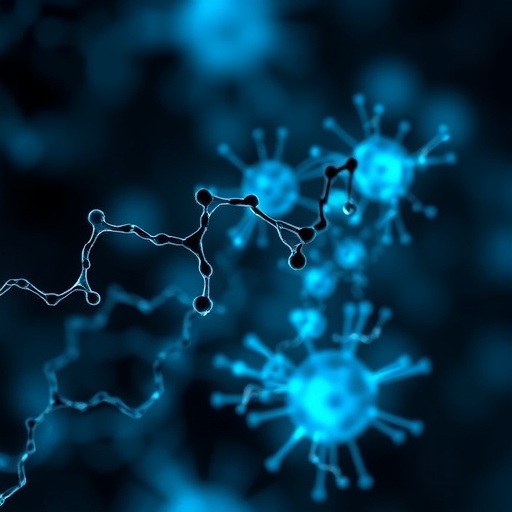
In a groundbreaking study published recently in the Journal of Biomedical Science, a team of researchers led by Dekkar and collaborators delves deep into the complex interplay between obesity and the functioning of gastric smooth muscle cells. The study reveals a previously unrecognized phenomenon: the phenotypic switching of these cells triggered by obesity. Such alterations in cellular behavior may have significant implications for gastric physiology and metabolism, potentially impacting the way we understand and treat obesity-related diseases.
Obesity, a global epidemic affecting millions, is not just a problem of excessive body weight but is associated with profound changes at the cellular level throughout the body. The research conducted by Dekkar and colleagues distinctly illustrates how excess adiposity can lead to morphological and functional changes within gastric smooth muscle cells. These cells, traditionally understood primarily for their mechanical role in digestion, are revealed to be dynamic actors in the metabolic landscape influenced by obesity. This phenotypic switching poses intriguing questions about the adaptive capabilities of smooth muscle cells and their potential roles in obesity-related pathologies.
The study highlights an intricate metabolic pathway: the activation of the PPARD/PDK4/ANGPTL4 signaling cascade. This pathway has long been the focus of research concerning metabolic regulation, highlighting how genetic and environmental factors interplay in the context of obesity. Findings suggest that the activation of this specific pathway in gastric smooth muscle cells initiates a shift from their standard functional state to a state more characteristic of what is often seen in response to chronic stress or injury. This raises critical questions about how these cells maintain homeostasis in adverse conditions and their eventual contribution to the development of gastric dysfunction.
Further exploration into the PPARD (Peroxisome Proliferator-Activated Receptor Delta) reveals its central role in lipid metabolism and energy homeostasis. It acts as a transcription factor, influencing gene expression related to fatty acid oxidation and energy expenditure. In the context of obesity, the dysregulation of PPARD activity can result in altered fatty acid processing, which may contribute to the changes observed in smooth muscle cell functions. The downstream effects of these alterations can amplify systemic metabolic disturbances characteristic of obese individuals.
PDK4 (Pyruvate Dehydrogenase Kinase 4) emerges as another key player in this pathway. Under normal conditions, PDK4 regulates glucose and fatty acid metabolism, helping to balance the energy demands of cells with their substrates. However, research indicates that during obesity, PDK4 expression may be misregulated, leading to an increased reliance on fatty acid oxidation, further compounding the metabolic burden on gastric smooth muscle cells. This finding illustrates the complex nature of cell metabolism during obesity, where the expectation of increased energy storage is countered by altered metabolic programming.
The ANGPTL4 (Angiopoietin-like 4) protein adds yet another layer of complexity. Known primarily for its role in lipid metabolism and regulation of angiogenesis, ANGPTL4 is secreted by fat cells and acts as a signaling molecule. The study indicates that during obesity, ANGPTL4 levels rise, influencing lipid metabolism not only in adipose tissue but also within vascular structures and muscle cells. This reveals a multidimensional interaction where enhanced ANGPTL4 expression in gastric smooth muscle cells promotes the performance of these altered metabolic functions, further leading to phenotypic changes.
The researchers employed a combination of in vitro and in vivo methodologies, reinforcing the impact of obesity on smooth muscle cells through various experimental approaches. Their findings underline the necessity for targeted interventions and further analysis of the molecular underpinnings of gastric smooth muscle physiology in the context of obesity. Notably, these insights could lead to potential therapeutic targets aimed at correcting the dysfunctional pathways activated by obesity, fundamentally altering the treatment avenues available for managing obesity-related complications.
Studies such as this play a pivotal role in bridging the gap between molecular biology and clinical practice. With a better understanding of the mechanisms by which obesity affects gastric smooth muscle cells, clinicians may be better equipped to devise strategies to mitigate the risk of obesity-related disorders. Furthermore, as public health initiatives strive to combat obesity on multiple fronts, these scientific revelations underscore the need to consider the biological processes at play, moving beyond traditional dietary and lifestyle recommendations.
The researchers emphasize that the knowledge derived from their study may not be confined to the realm of gastric health but could extend to broader aspects of metabolic syndrome. By elucidating the phenotypic shifts within smooth muscle cells, it can provide a clearer understanding of how visceral fat accumulation alters various organ systems and their functions, thereby demonstrating the necessity of an integrated approach to obesity research and treatment.
Mapping the precise molecular mechanisms connecting obesity, PPARD, PDK4, and ANGPTL4 represents an exciting frontier for future research endeavors. Investigating how these pathways can be modulated will be instrumental in developing effective therapies aimed at restoring normal function to gastric smooth muscle cells in obese patients. The intersection of obesity, cellular signaling, and metabolic health serves as a rich field for exploration, promising insights that could revolutionize treatment methodologies.
In conclusion, this study acts as a call to action for both researchers and clinicians alike, urging a transition toward a more nuanced understanding of obesity and its effects on cellular functions across various organ systems. As more discoveries materialize regarding the cellular changes induced by obesity, it holds the potential to inform public health strategies and encourage targeted research efforts aimed at reversing the obesity epidemic. Ultimately, the intricate relationships unveiled in this research promise to reshape not only our understanding of gastric smooth muscle cells but also our overall approach to managing health in an increasingly obese population.
Subject of Research: The impact of obesity on gastric smooth muscle cell phenotypic switching through the PPARD/PDK4/ANGPTL4 pathway.
Article Title: Obesity induces phenotypic switching of gastric smooth muscle cells through the activation of the PPARD/PDK4/ANGPTL4 pathway.
Article References:
Dekkar, S., Mahloul, K., Falco, A. et al. Obesity induces phenotypic switching of gastric smooth muscle cells through the activation of the PPARD/PDK4/ANGPTL4 pathway.
J Biomed Sci 32, 67 (2025). https://doi.org/10.1186/s12929-025-01163-5
Image Credits: AI Generated
DOI: 10.1186/s12929-025-01163-5
Keywords: Obesity, Gastric Smooth Muscle Cells, Phenotypic Switching, PPARD, PDK4, ANGPTL4, Metabolism, Pathway Activation.
Tags: cellular changes due to obesityimplications of obesity on gastric physiologymechanistic insights into obesitymetabolic pathways in obesitymetabolic regulation in obesityobesity and gastric smooth muscle cellsobesity as a global epidemicobesity-related diseases and treatmentphenotypic switching in smooth musclePPARD PDK4 ANGPTL4 signaling cascaderesearch on gastric smooth muscle alterationssmooth muscle cell dynamics and metabolism




